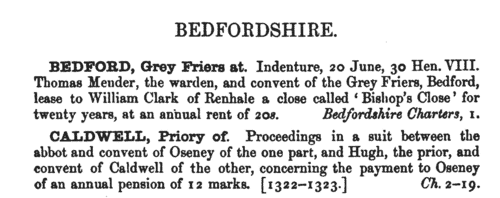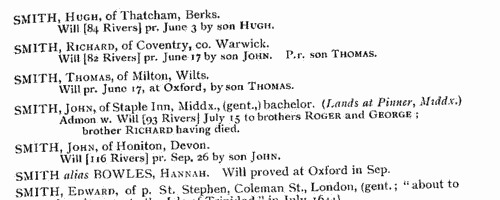Bellers Surname Ancestry ResultsOur indexes 1000-1999 include entries for the spelling 'bellers'. In the period you have requested, we have the following 40 records (displaying 1 to 10): Single Surname Subscription | | | Buying all 40 results of this search individually would cost £202.00. But you can have free access to all 40 records for a year, to view, to save and print, for £100. Save £102.00. More... |
These sample scans are from the original record. You will get scans of the full pages or articles where the surname you searched for has been found. Your web browser may prevent the sample windows from opening; in this case please change your browser settings to allow pop-up windows from this site. Clergy, the religious and the faithful in Britain and Ireland
(1342-1362)
These are abstracts of the entries relating to Great Britain and Ireland from the Regesta of popes Clement VI and Innocent VI, from the period when the papal court was resident at Avignon. Many of these entries relate to clerical appointments and disputes, but there are also indults to devout laymen and women for portable altars, remission of sins, &c. This source is particularly valuable for Ireland, for which many of the key government records of this period are lost. Clement VI was consecrated and crowned 19 May 1342 (the day from which his pontificate is dated); Innocent VI was crowned 18 December 1352 and died 12 September 1362. The extracts were made by W. H. Bliss and C. Johnson from Regesta cxxxvii to ccxliv, and published in 1897. The registers are almost complete for these two pontificates. At his accession, Clement VI promised to grant benefices to all poor clerks who should come to Avignon and claim them within two months of his coronation. As many as 100,000 are said to have come, and the register for the first year of his pontificate runs to twelve volumes.BELLERS. Cost: £4.00.  | Sample scan, click to enlarge

| Clergy, the religious and the faithful in Britain and Ireland
(1362-1404)
These are abstracts of the entries relating to Great Britain and Ireland from the Regesta of popes Urban V, Gregory XI, (Anti-Pope) Clement VII, Urban VI and Boniface IX, and the Lateran Regesta of Boniface IX. Many of these entries relate to clerical appointments and disputes, but there are also indults to devout laymen and women for portable altars, remission of sins, &c. This source is particularly valuable for Ireland, for which many of the key government records of this period are lost. Urban V was consecrated and crowned 6 November 1362 (the day from which his pontificate is dated); Gregory XI was crowned 5 January 1371; Clement VII 31 October 1378; Urban VI 18 April 1378; Boniface IX 9 November 1389 and died 1 October 1404. Until 1376 the papacy was in exile at Avignon. The extracts were made by W. H. Bliss from Regesta ccxlv to cccxx and Lateran Regesta i to xliii, and published in 1902. Bliss remarked that 'although the writing of the Papal Registers of the 14th century is clearer than that of many contemporary English MSS., the entries in them were for the most part founded upon petitions or letters from different countries, and the scribes in the Papal Chancery must have experienced even greater difficulty in copying English proper names than English students experience nowadays in reading the early Chancery Rolls preserved in the Public Record Office. Not having local or personal knowledge, they constantly misread doubtful letters.'BELLERS. Cost: £4.00.  | Sample scan, click to enlarge

| Grantees of offices, commissions and pardons
(1413-1416)
The Patent Rolls are the Chancery enrolments of royal letters patent. Those for the 1st, 2nd and 3rd years of the reign of king Henry V (21 March 1413 to 20 March 1416) were edited for the Public Record Office by R. C. Fowler, and published in 1910. The main contents are royal commissions and grants; ratifications of ecclesiastical estates; writs of aid to royal servants and purveyors; and pardons. The commissions of the peace issued for the English towns and counties and entered on the rolls, being largely repetitive, have been consolidated in a single appendix.BELLERS. Cost: £2.00.  | Sample scan, click to enlarge

| Close Rolls
(1429-1435)
The close rolls of the 8th to 13th years of the reign of king Henry VI record the main artery of government administration in England, the orders sent out day by day to individual officers, especially sheriffs of shires: they are an exceptionally rich source for so early a period. There is also some material relating to Wales, Scotland, Ireland and the English possessions in France. Also included is the Exchange Roll of 1424 to 1434, of licences to transmit sums of money out of the realm.BELLERS. Cost: £4.00.  | Sample scan, click to enlarge

| Close Rolls
(1441-1447)
The close rolls of the 20th to 25th years of the reign of king Henry VI record the main artery of government administration in England, the orders sent out day by day to individual officers, especially sheriffs of shires: they are an exceptionally rich source for so early a period. There is also some material relating to Wales, Scotland, Ireland and the English possessions in France. BELLERS. Cost: £4.00.  | Sample scan, click to enlarge

| Hertfordshire Charters
(1440-1449)
A large accumulation of documents preserved in the Bodleian Library, Oxford, formerly constituted the antiquarian collections of Anthony a Wood, Roger Dodsworth, Ralph Thoresby, Thomas Martin of Palgrave, Thomas Tanner bishop of St Asaph, Dr Richard Rawlinson, Richard Furney archdeacon of Surrey, and Richard Gough. A calendar of these was prepared by William H. Turner and published in 1878 under the title 'Calendar of Charters and Rolls preserved in the Bodleian Library'. The word 'charters' is here used in a very general sense, including virtually any manuscript or copy of a manuscript, but the bulk of the contents consists of mediaeval deeds of conveyance. Turner's calendar deals with each briefly, naming the principal parties and the nature of the deed, but hardly ever lists the witnesses. Many of these charters were undated (dating of deeds did not become standard until around 1350) or so damaged or defective ('mutilated' is Turner's usual description) as no longer to display a legible date. However, he contrived, from the style of the script and/or the nature of the contents, to estimate dates in such cases. The sample scan is from the start of the Bedfordshire list.BELLERS. Cost: £4.00.  | Sample scan, click to enlarge

| Inhabitants of Leicester
(1327-1509)
The Corporation of Leicester commissioned the publication (in 1901) of extracts from the borough archives of 1327 to 1509, edited by Mary Bateson. This volume brings together several important sources: a coroner's roll of 1327; the merchant gild rolls; tax returns; court rolls; rentals; mayoral accounts, &c. All the Latin and French texts are accompanied by English translations. Not all the tax rolls surviving for this period are printed: but full lists of names are given for tallages of 1336 (pp. 34-40); 1347-8 (69-71); and 1354 (93-99); subsidy rolls of 1492 (331-334) and 1497 (351-353); and a benevolence roll of 1505 (370-374). There is a calendar of conveyances (388-446), and a list of mayors, bailiffs, and other officials (447-462); and, finally, entrants into the merchant gild
from 1465 to 1510. Membership of the merchant gild was by right of inheritance (s. p. = sede patris, in his father's seat), or by payment of a fee called a 'bull' (taurus). Those marked * paid their bull, and were thus, by implication, not natives, or at least not belonging to gild merchant families. By 1400 membership of the gild merchant had become the equivalent of gaining freedom of the borough (being a free burgess): but thitherto the two were not necessarily the same, and some of the merchant gild members were not resident in the borough, merely traded there.BELLERS. Cost: £4.00.  | Sample scan, click to enlarge

| Tradesmen of York
(1272-1558)
No man or woman could trade in the city of York without having obtained 'freedom' of the city.Their names were recorded on the 'Freemen's Roll', or Register of the Freemen of the City of York, which contains about 19,900 names for this period. A list of names was prepared for each year, the year being here reckoned as starting at Michaelmas (29 September) until 1373, and thence at Candlemas (2 February). Each annual list starts with the name of the mayor and the camerarii or chamberlains. The chamberlains were freemen charged with the duty of receiving the fees of the new freemen; of seeing that only freemen traded in the city; and of preparing this roll, which was compiled from the names on their own account books from the receipts for the fees. There are three groups of freemen: those who obtained freedom after serving out an apprenticeship to a freeman; the children of freemen; and those who claimed freedom by 'redemption', i. e. by purchase or gift from the Mayor and Court of Aldermen.
BELLERS. Cost: £2.00.  | Sample scan, click to enlarge

| Hastings family deeds
(1100-1600)
John Harley of the Historical Manuscripts Commission was invited by Reginald Rawdon Hastings to examine his family's extensive archives at the Manor House, Ashby de la Zouche, in Leicestershire. Harley produced a detailed calendar, of which is the first volume, published in 1928, Hastings himself having since died, and Harley having been killed at Gallipoli. This volume covers four categories of the records: the Ancient Deeds; Manorial and other Documents; Accounts and Inventories; and Miscellaneous Papers. Most, but not all, of the material is mediaeval. About half of the deeds relate to the family property in Leicestershire; then there are sections for Derbyshire, Nottinghamshire, Northamptonshire, Lincolnshire, Warwickshire, Staffordshire, Yorkshire, Northumberland, Norfolk, Cambridgeshire, Huntingdonshire, London, Wiltshire, Somersetshire, Devonshire, Buckinghamshire, Oxfordshire, &c. The manorial section includes a partitions of the estates of the Earls of Leicester and Wilton about 1204 and 1277; manor court rolls are mentioned, but not extracted. Choicer items from the family accounts and inventories are copied in extenso for 1596 and 1607, and thereafter summarised. Most of the later material is merely dipped into for curiosities.BELLERS. Cost: £4.00.  | Sample scan, click to enlarge

| PCC Probates and Administrations
(1646)
The Prerogative Court of Canterbury's main jurisdiction was central and southern England and Wales, as well as over sailors &c dying abroad: these brief abstracts, compiled under the title "Year Books of Probates", and printed in 1906, usually give address, date of probate and name of executor or administrator. They are based on the Probate Act Books, cross-checked with the original wills, from which additional details are, occasionally, added. The original spelling of surnames was retained, but christian and place names have been modernised where necessary.BELLERS. Cost: £2.00.  | Sample scan, click to enlarge

|
Research your ancestry, family history, genealogy and one-name study by direct access to original records and archives indexed by surname.
|












